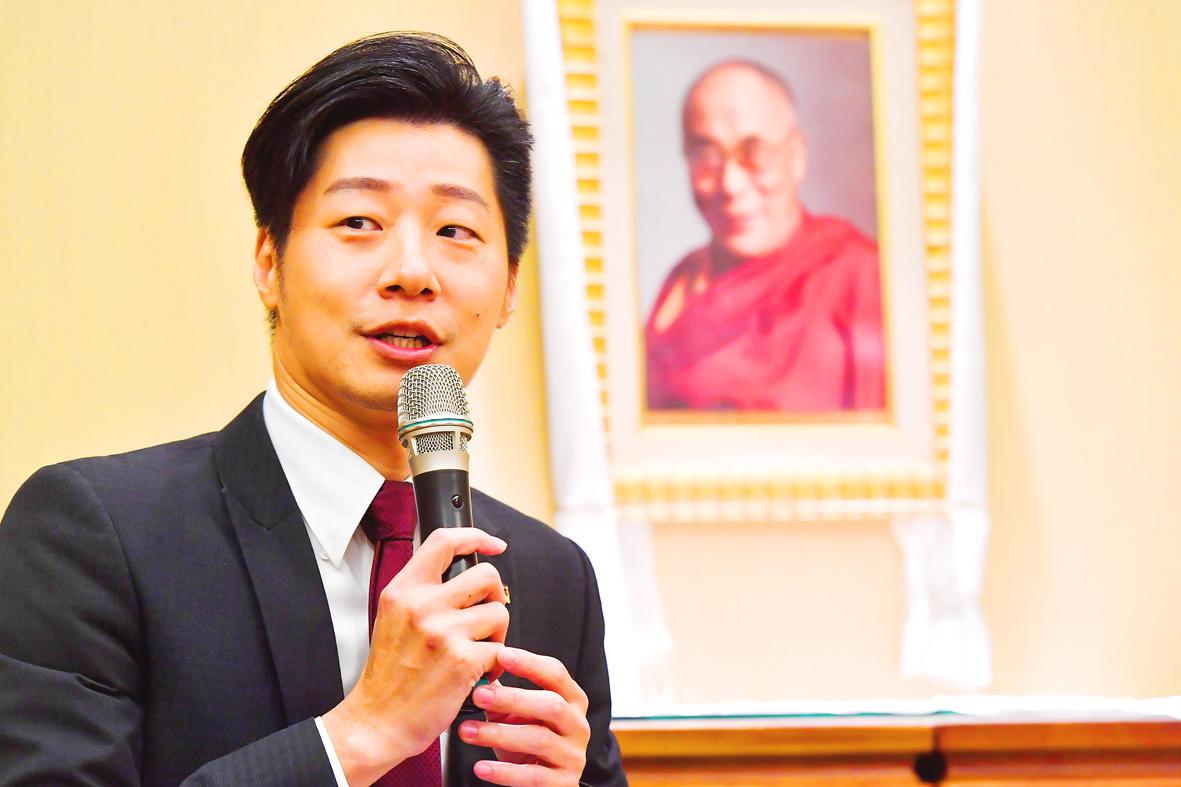Independent Legislator Freddy Lim (林昶佐) yesterday formed the Taiwan Parliamentary Group for Tibet for the current legislative term, while calling on the Democratic Progressive Party administration to go along with the Dalai Lama, who on Sunday during a livestream said that he would like to pay the nation another visit.
The group was joined by 46 lawmakers across party lines, making it larger than the iteration in the previous legislative session, Lim said.
After the Buddhist leader expressed his desire to visit the nation, the Ministry of Foreign Affairs said that a visit would go ahead “when the time is convenient for both sides,” Lim said, asking when it would be a “convenient time” for the nation.

Photo: CNA
The nation should adopt a firmer stance on its support of human rights and say: “Whenever is a convenient time for the Dalai Lama is a convenient time for us,” the lawmaker said.
Thanks to the efforts of the previous group, the Mongolian and Tibetan Affairs Commission was abolished, allowing Tibet a “normalized and equal” channel for exchanges with the nation, he said.
The new group would continue to uphold the rights of Tibetans in the nation, but also concern itself with Beijing’s arbitrary implementation of the Hong Kong national security legislation, its establishment of internment camps in China’s Xinjiang region and its infringement on religious freedom in Tibet, he said.
Hopefully, the group would function as a hub that could rally international support for Tibet and human rights, Lim added.
Tibet signed a peace treaty with China, but within eight years it proved to be a failure, Tibet Religious Foundation of His Holiness the Dalai Lama chairman Dawa Tsering said.
Tibet is a symbol of peace worldwide, yet it cannot live in peace with China, he said.
He said that he hopes to see discussions about Chinese oppression grow in Taiwan, which has managed to keep its sovereignty in the face of daunting threats by Beijing.

CHAOS: Iranians took to the streets playing celebratory music after reports of Khamenei’s death on Saturday, while mourners also gathered in Tehran yesterday Iranian Supreme Leader Ayatollah Ali Khamenei was killed in a major attack on Iran launched by Israel and the US, throwing the future of the Islamic republic into doubt and raising the risk of regional instability. Iranian state television and the state-run IRNA news agency announced the 86-year-old’s death early yesterday. US President Donald Trump said it gave Iranians their “greatest chance” to “take back” their country. The announcements came after a joint US and Israeli aerial bombardment that targeted Iranian military and governmental sites. Trump said the “heavy and pinpoint bombing” would continue through the week or as long

TRUST: The KMT said it respected the US’ timing and considerations, and hoped it would continue to honor its commitments to helping Taiwan bolster its defenses and deterrence US President Donald Trump is delaying a multibillion-dollar arms sale to Taiwan to ensure his visit to Beijing is successful, a New York Times report said. The weapons sales package has stalled in the US Department of State, the report said, citing US officials it did not identify. The White House has told agencies not to push forward ahead of Trump’s meeting with Chinese President Xi Jinping (習近平), it said. The two last month held a phone call to discuss trade and geopolitical flashpoints ahead of the summit. Xi raised the Taiwan issue and urged the US to handle arms sales to

BIG SPENDERS: Foreign investors bought the most Taiwan equities since 2005, signaling confidence that an AI boom would continue to benefit chipmakers Taiwan Semiconductor Manufacturing Co’s (TSMC, 台積電) market capitalization swelled to US$2 trillion for the first time following a 4.25 percent rally in its American depositary receipts (ADR) overnight, putting the world’s biggest contract chipmaker sixth on the list of the world’s biggest companies by market capitalization, just behind Amazon.com Inc. The site CompaniesMarketcap.com ranked TSMC ahead of Saudi Aramco and Meta Platforms Inc. The Taiwanese company’s ADRs on Tuesday surged to US$385.75 on the New York Stock Exchange, as strong demand for artificial intelligence (AI) applications led to chip supply constraints and boost revenue growth to record-breaking levels. Each TSMC ADR represents

Pro-democracy media tycoon Jimmy Lai’s (黎智英) fraud conviction and prison sentence were yesterday overturned by a Hong Kong court, in a surprise legal decision that comes soon after Lai was jailed for 20 years on a separate national security charge. Judges Jeremy Poon (潘兆初), Anthea Pang (彭寶琴) and Derek Pang (彭偉昌) said in the judgement that they allowed the appeal from Lai, and another defendant in the case, to proceed, as a lower court judge had “erred.” “The Court of Appeal gave them leave to appeal against their conviction, allowed their appeals, quashed the convictions and set aside the sentences,” the judges